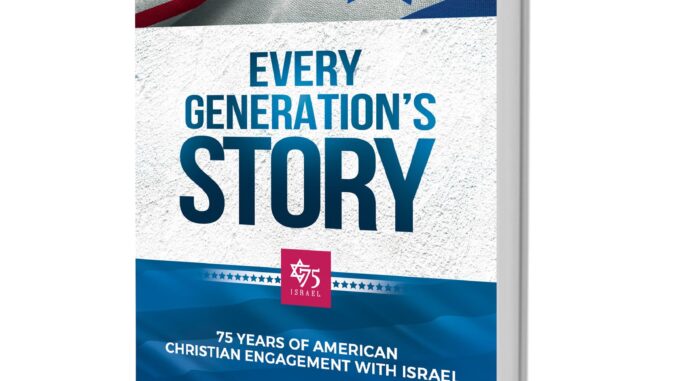
By: Jonathan Feldstein
If a book were a candy store, and I was a kid, “Every Generation’s Story: 75 Years of American Christian Engagement with Israel” would be my kid in a candy store scenario. As I read page after page, I couldn’t help but be inspired and drawn into one author’s story after another, wanting more and more.
You see, as an Orthodox Jew called to build bridges between Jews and Christians, I am blessed by many, many deep friendships with Christians who love and support Israel unconditionally. Biblically. Even though it is something that is commonplace in many churches in many parts of the world, it is something that historically is still relatively new and noteworthy yet, cannot and must not be taken for granted. I don’t.
As much as it is commonplace for Christians to share their testimony about how and when they became Christian, this book in many ways is a compilation of testimonies how Christians became Christian Zionists. And as much as it is commonplace for me to interact and have deep friendships with many Christians Zionists, reading these stories are no less inspiring and moving. Perhaps, because of how personal it is, it never gets old.
Dr. Susan Michael is the editor of this important work, and one of the authors. I’ve admired her personally and her work for years, building bridges between Jews and Christians, with grace and integrity. This is another important part of her work and a true treasure.
While all of the personal accounts are unique and interesting in their own right, I was drawn to two particular categories which are cleverly compiled by age. First, as I made it to be a baby boomer by a few hours, I was drawn to the people older than myself as baby boomers and members of what are referred to as the silent generation. These are people who grew up with the news of Israel’s restoration and early wars where God proved Israel victorious as part of their consciousness. It is a part of their life and narrative, not from history books but from their own personal recollections. I am interested, and honestly envious of that, because my memories are less vivid.
The second category of writers that especially moved me are the youngest, millennials and Gen Z. This is so important in an age where even young Christians support for Israel has decreased by as much as 50% from the previous decade. It’s all the more inspiring because the prism through which these writers look at Israel is based on others’ accounts and seeing a mature reality today rather than Israel’s early history and struggles unfolding before their eyes. The truth is that this generation would not be wrong to take Israel and its success and significance for granted. But these writers don’t. That’s significant.
As I read each of the chapters, each authored by a different person with a different background, even if I’d known them previously, I felt like I was getting to know them much more intimately. I felt like I was privileged to be engaged in a dialogue about something that’s so important to them, who they are, who they have become, and their faith. This depicts the kind of relational approach that I aspire to in building bridges between Jews and Christians. It’s not a matter of telling someone what to think, or simply objectifying them in a transactional relationship, but rather getting to know them each individually, and uniquely. I enjoyed getting to know each of them.

As we mark Israel’s 75th year of independence and I was inspired to publish a very different kind of book (Israel the Miracle) also featuring Christian authors that will be published later in the year, indeed the publishing of “Every Generation’s Story” is a noteworthy and important addition to celebrating Israel’s diamond anniversary. It’s also amazing to see dozens of Christians come together for a common purpose, to celebrate Israel, expressing such a wide range of perspectives, all of which are not only not repetitive, but indeed complementary.
As much as there’s deep substance, “Every Generation’s Story” is also replete with deep symbolism. Eighteen people are profiled, in their own words. For most Christians, 18 is a random number, more than 15, less than 20. But Jews know the significance immediately. The Hebrew letters that spell the word for life, chai, have the numerical value of 18. It’s meaningful to have this number represented because it underscores another connection to and understanding of Jewish life. But it was especially meaningful given that while I was reading at home one Shabbat afternoon, I heard children singing outside, “Am Yisrael Chai,” the people of Israel live. For kids in Israel, it’s just a song to sing when playing, part of who we are. Eighteen is very significant. Special kudos to Susan Michael, for making this an all the more significant way to connect Christians with Israel, the Jewish people, our thousands of years of traditions, and language.
I pray that millions of Christians will read this book, and be inspired and educated in ways that they have not been before, and that other Jews will also read the book to understand bit more about the nature of Christian Zionism and its modern-day realization. From that, the takeaway is how all Christians can and should connect more deeply with Israel, not just because God says to bless Israel, but because doing so adds tremendous dimension to one’s own faith as a Christian.
Jonathan Feldstein is President of the Genesis 123 Foundation and RunforZion.com, building bridges between Jews and Christians. He is the host of the “Inspiration from Zion” podcast, and editor of the forthcoming book “Israel the Miracle.” He and his family made moved to Israel in 2004. He can be reached at FirstPersonIsrael@gmail.com.
